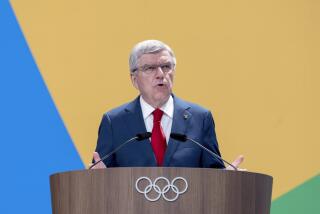Budapest to withdraw bid for 2024 Olympics, leaving L.A. and Paris as only contenders

- Share via
Reporting from BUDAPEST, Hungary — News that Budapest, Hungary, plans to drop its bid for the 2024 Summer Olympics probably won’t have a tremendous effect on the overall race.
From the start, Los Angeles and Paris were considered the favorites to stage the Games.
But with only those two cities remaining in contention, Budapest’s withdrawal would deliver yet another blow to the International Olympic Committee, which in recent years has struggled to find willing hosts.
“This goes beyond bad optics,” said Jules Boykoff, a political science professor at Pacific University in Oregon who studies the Olympic movement. “It shows there is a serious trend of bidders dropping like flies.”
The current bidding cycle has already seen Boston, Hamburg and Rome back away over public concerns about the billions of dollars required to host the Games.
Similar defections left only two cities — Beijing and Almaty, Kazakhstan — vying for the 2022 Winter Games.
Budapest’s campaign hit trouble in recent weeks when a political group collected more than 266,000 signatures in hopes of forcing a referendum on the issue.
On Wednesday, the Hungarian Olympic Committee reached a joint decision with national and municipal leaders to withdraw in advance of a potential vote, according to news reports.
With the Budapest city council yet to vote on the matter, a spokesman for the Budapest 2024 committee declined to comment. But bid leader Balazs Furjes told Hungarian media earlier in the week: “This ship has sailed, it seems.”
Competing against two major metropolitan centers, the Hungarian capital had based its campaign on Old World charm and a compact cluster of venues.
The apparent failure of that vision could revive concerns that only large cities can realistically hope to win the Games.
Los Angeles and Paris have claimed they can operate the 17-day event on a balanced budget in large part because they have dozens of stadiums and arenas already in place.
The LA 2024 committee, in particular, has said it can cover an estimated $5.3 billion in costs with revenues earned from sources such as broadcast rights, corporate sponsorships and ticket sales.
Added to the reported financial struggles of two recent hosts that had much to build — Rio de Janeiro and Sochi, Russia — Budapest’s downfall may scare IOC members away from taking a chance on midsize cities, at least in the short run.
“That’s what is happening now,” said Robert Livingstone, who follows bidding for the Toronto-based website GamesBids.com. “And it’s a problem for the IOC.”
Olympic officials also face the threat of referendums in any city that announces its intention to bid.
Having just returned from Budapest, Livingstone said he heard considerable speculation that the Momentum Mozgalom group was using the issue to attract attention.
“The Olympics are obviously a huge stage for someone to further their political agenda,” he said.
The 2024 bidding competition has entered its final stage, with candidates traveling the world to make pitches to IOC members. Olympic evaluators are scheduled to visit each city in the spring. The IOC will select a host in September. Even if two cities remain, members were hoping for a wider choice.
More to Read
Go beyond the scoreboard
Get the latest on L.A.'s teams in the daily Sports Report newsletter.
You may occasionally receive promotional content from the Los Angeles Times.











